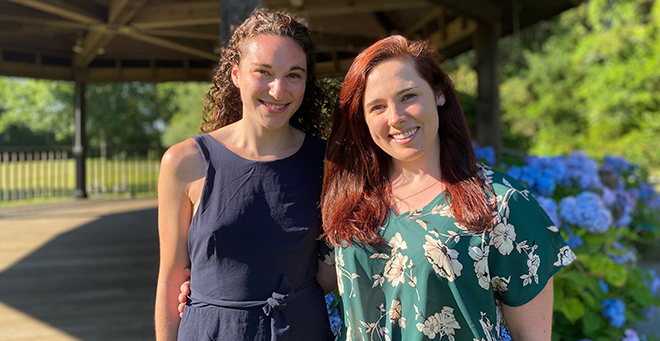
|
Haley Schachter, SOM ’22, and Aisling Ryan, RN, DNP candidate in the GSN, are the recipients of the 2020 Mick Huppert Community Health Scholar Award. The award honors the work and mission of the late Mick Huppert, MPH, a UMMS faculty member who was passionate about community health improvement initiatives and public health.
Ryan and Schachter’s project is based on their work in the population health clerkship that began in 2019, in which they collaborated with Patrick Joslin, SOM ’22, and Kevin Makhoul, SOM ’22. The study is analyzing data from the Outer Cape Health Services Community Navigator Program and will share the findings to help refine and strengthen the program. The program utilizes community health workers, called navigators, to identify people in the rural outer Cape communities who are struggling with social determinants of health disparities and, frequently, mental health and substance use disorders. Navigators coordinate care and bridge clients to area resources and social and health services to address their challenges.
“The outcomes of community-based programs with community health workers or navigators has not been widely studied in these areas,” said Ryan. “Our overall goal is to expand the program’s impact of treating social isolation, a dominant contributing factor to patients’ social determinants of health challenges, especially as we are living through a pandemic.”
“We have a specific interest in how patient-to-navigator contact translates to success in the program,” said Schachter. “We measured this contact based on successful phone calls and in-person meetings documented in the medical records of 110 patients. I will continue to work on this project as my capstone.”
The project also incorporates data from the Outer Cape Health Services self-sufficiency matrix assessment, which measures and ranks patients’ social determinants of health every three months to track progress. Schachter and Ryan are looking at trends that will help navigators find the best ways to refer resources. With the help of a biostatistician at UMMS, outcomes are evaluated by comparing self-sufficiency matrix scores with qualitative information such as the patient record, interviews with navigators and interviews with staff.
“Our project prioritizes the analysis of patient-to-navigator interaction, as we intend to provide strong evidence of the program as a community-based intervention for social determinants of health,” said Ryan. “With the data, literature review and interviews with navigators, we are working to make the intake process more efficient and accessible.”
The mentors for this project are Andy Lowe, chief strategy officer at Outer Cape Health Services and an instructor in family medicine & community health at UMMS, and Suzanne Cashman, DSc, professor of family medicine & community health. Lowe said Ryan and Schachter’s data analysis is important to the program development.
“Their work is so helpful to us at Outer Cape Health Services,“ said Lowe. “They took raw self-sufficiency matrix data and transformed it into the contextual information needed to inform improvements to the navigator program. This will enable our navigators to identify patient needs more rapidly and result in an onboarding process that is more efficient and focused on our patients’ needs. Both students are clearly future leaders as well as effective team players. I have been so impressed by the compassion and empathy they have demonstrated for the health equity issues facing our patients. Their innovation in combining medical and nursing knowledge is admirable.”
Schachter and Ryan received $2,500 in funding from their Mick Huppert Community Health Scholar Award. Their project was also recognized with the GSN Interprofessional Community Service Award, which acknowledges students who go above and beyond and demonstrate interprofessional teamwork to improve population-based outcomes.